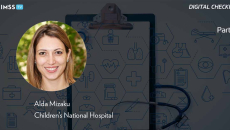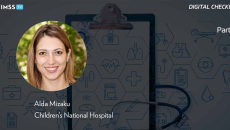Artificial Intelligence
Alda Mizaku says the health system also is using artificial intelligence to boost predictive analytics efforts, among other use cases. And she offers advice to peers looking to become healthcare Chief AI Officers.
Alda Mizaku, chief data and AI officer at the prominent provider organization, discusses leveraging artificial intelligence for creating efficiencies in both clinical and office settings, and for boosting predictive analytics.
National Taiwan University Hospital has incorporated speech-to-text AI in its telehealth platform.
Alda Mizaku, chief data and artificial intelligence officer at the DC-based hospital, explains what skills are needed for this emerging C-suite position, and explains why an enterprise AI leader must be able to talk with anyone in any department.
The aim of the collaboration is to harness the "leading-edge power of quantum computing to shape the future of healthcare and technology" and create "a robust ecosystem that will attract, educate and retain top talent."
The new hires have deep public and private sector experience and will lead HHS efforts around artificial intelligence, data and digital technology within the Assistant Secretary for Technology Policy's Office of the CTO.
That's what Children's National Hospital was looking for when it hired Alda Mizaku to be its chief data and AI officer. Here she offers a deep dive into her role and advice for others seeking this hot new healthcare job.
Artificial intelligence can boost efficiency of imaging providers and support roles that offer greater provider productivity, says The Gordian Knot Group's Dawn Cram, who offers a preview of her HIMSS25 session on the subject.
Mayo Clinic takes its artificial intelligence-powered documentation platform enterprise-wide, Google Cloud collaborates on drug repurposing AI and a government-funded infectious disease risk model aims to improve public health resilience.
The future of healthcare artificial intelligence is "additive," says Dr. William Morris, Ambience Healthcare CMO. He sees health systems convening their leaders around AI scribes, which is helping to drive their digital transformation.









